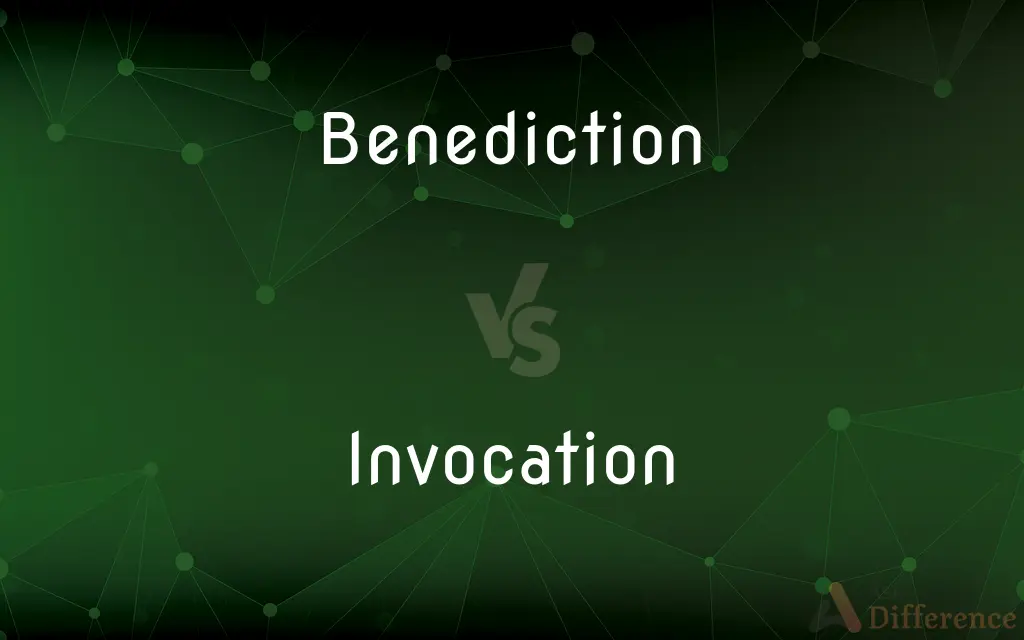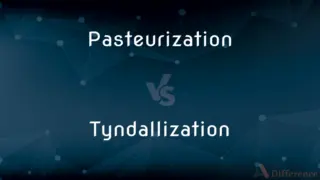Benediction vs. Invocation — What's the Difference?
By Maham Liaqat & Urooj Arif — Updated on March 15, 2024
Benediction is a blessing or expression of good wishes, often used at the end of a religious service, while an invocation is a call for support or inspiration, typically at the beginning.

Difference Between Benediction and Invocation
Table of Contents
ADVERTISEMENT
Key Differences
Benediction, in religious contexts, refers to a ceremonial expression of blessing or good wishes, usually delivered by a clergy member towards the end of a service. It is meant to invoke divine favor on the congregation. Whereas, an invocation is often found at the beginning of religious ceremonies, meetings, or gatherings and involves calling upon a higher power for assistance, guidance, or presence during the event.
Benedictions are characterized by their intent to bestow peace, protection, and well-being upon individuals or groups, often accompanied by a symbolic gesture such as the sign of the cross. On the other hand, invocations may not only seek divine presence but can also request inspiration, wisdom, or strength, addressing specific needs or purposes of the gathering.
The language used in benedictions tends to be comforting and assuring, focusing on the future well-being and safety of the participants as they depart from the service. In contrast, invocations might employ more varied language, tailored to the specific aims of the event or ceremony, emphasizing the desired outcome or the necessity of divine guidance.
While benedictions are mostly associated with Christian traditions, where they are a common closing rite, the practice of invocation is more universally found across various religions and secular events, highlighting its broader application in seeking external support or influence.
Benedictions and invocations, though differing in placement and purpose within ceremonies, share the commonality of involving a verbal appeal to a higher power, reflecting humanity's longstanding tradition of seeking external affirmation and guidance in communal activities.
ADVERTISEMENT
Comparison Chart
Purpose
To bestow blessings and good wishes
To call for support, guidance, or presence
Position in Ceremony
Typically at the end
Usually at the beginning
Common Contexts
Religious services, weddings, funerals
Religious services, public meetings, events
Language Tone
Comforting, assuring
Varied, depending on the desired outcome
Universal Application
More specific to certain religious traditions
Broadly used across various religions and secular contexts
Compare with Definitions
Benediction
A benediction is a short blessing or prayer asking for divine protection and happiness.
The priest concluded the service with a benediction, blessing all attendees.
Invocation
An invocation is a prayer or appeal for assistance, guidance, or presence, often at the start of a ceremony or event.
The conference began with an invocation for wisdom and unity among the participants.
Benediction
In a broader sense, benediction can refer to any expression of good wishes.
The farewell note was filled with words of benediction for her future endeavors.
Invocation
It can also refer to the act of invoking something, like a law or principle.
The attorney's invocation of the precedent case was pivotal to her argument.
Benediction
It can signify a formal approval or sanction.
The project received the benediction of the board, allowing it to proceed.
Invocation
Invocation in programming refers to the process of calling a method or function.
The software's efficient invocation of system calls improved its performance.
Benediction
Benediction is also used in literature to denote a final blessing or hopeful message at the end of a work.
The novel ended with a benediction that left readers feeling uplifted.
Invocation
In literary contexts, an invocation can be a plea for inspiration, traditionally to a muse at the beginning of an epic.
The poet's invocation to the muses was meant to imbue his work with creativity and depth.
Benediction
Benediction may refer to the act of blessing objects, such as religious artifacts.
The benediction of the new chapel's cornerstone was a significant event for the community.
Invocation
It can also imply summoning a spirit or deity in some religious or magical practices.
The ritual included an invocation of ancestral spirits for guidance.
Benediction
A benediction (Latin: bene, well + dicere, to speak) is a short invocation for divine help, blessing and guidance, usually at the end of worship service. It can also refer to a specific Christian religious service including the exposition of the eucharistic host in the monstrance and the blessing of the people with it.
Invocation
An invocation (from the Latin verb invocare "to call on, invoke, to give") may take the form of: Supplication, prayer or spell. A form of possession.
Benediction
A blessing.
Invocation
The act or an instance of invoking, especially an appeal to a higher power for assistance.
Benediction
An invocation of divine blessing, usually at the end of a church service.
Invocation
A prayer or other formula used in invoking, as at the opening of a religious service.
Benediction
Often Benediction Roman Catholic Church A short service consisting of prayers, the singing of a Eucharistic hymn, and the blessing of the congregation with the host.
Invocation
The act of conjuring up a spirit by incantation.
Benediction
An expression of good wishes.
Invocation
An incantation used in conjuring.
Benediction
A short invocation for help, blessing and guidance from God, said on behalf of another person or persons (sometimes at the end of a church worship service).
To pronounce / give / say the benediction; the nuptial benediction; a parting benediction
Invocation
The act or form of calling for the assistance or presence of some superior being, especially prayer offered to a divine being.
Benediction
In the Anglican church, the ceremony used to institute an abbot, analogous to the consecration of a bishop.
Invocation
A call or summons, especially a judicial call, demand, or order.
The invocation of papers or evidence into court
Benediction
A Roman Catholic rite by which bells, banners, candles, etc., are blessed with holy water and formally dedicated to God.
Invocation
(law) An act of invoking or claiming a legal right.
Benediction
Help, good fortune or reward from God or another supernatural source.
Invocation
(programming) The act of invoking, such as a function call.
Benediction
The act of blessing.
Invocation
The act or form of calling for the assistance or presence of some superior being; earnest and solemn entreaty; esp., prayer offered to a divine being.
Sweet invocation of a child; most pretty and pathetical!
The whole poem is a prayer to Fortune, and the invocation is divided between the two deities.
Benediction
A blessing; an expression of blessing, prayer, or kind wishes in favor of any person or thing; a solemn or affectionate invocation of happiness.
So saying, he arose; whom Adam thusFollowed with benediction.
Homeward serenely she walked with God's benediction upon her.
Invocation
A call or summons; especially, a judicial call, demand, or order; as, the invocation of papers or evidence into court.
Benediction
The form of instituting an abbot, answering to the consecration of a bishop.
Invocation
A prayer asking God's help as part of a religious service
Benediction
A solemn rite by which bells, banners, candles, etc., are blessed with holy water, and formally dedicated to God.
Invocation
An incantation used in conjuring or summoning a devil
Benediction
The act of praying for divine protection
Invocation
Calling up a spirit or devil
Benediction
A ceremonial prayer invoking divine protection
Invocation
The act of appealing for help
Common Curiosities
Are benedictions only religious in nature?
While commonly used in religious contexts, benedictions can also be secular expressions of good wishes.
Is it common for both a benediction and an invocation to be used in the same event?
Yes, especially in religious services, an invocation may start the ceremony, and a benediction can conclude it.
Can invocations be part of secular events?
Yes, invocations can be used in secular contexts to seek guidance or unity for the event at hand.
How does the purpose of invocations vary across different settings?
The purpose can range from seeking divine guidance to inspiring unity or creativity, depending on the setting.
Is the effectiveness of a benediction dependent on the belief system of the recipients?
While the impact may be enhanced by shared beliefs, benedictions can also be appreciated as expressions of goodwill by those of different or no faith.
Can a benediction have a lasting impact beyond the moment it is given?
Yes, the positive wishes and sense of community engendered by a benediction can have a lasting emotional and psychological impact.
Can an invocation be made to entities other than a deity?
Yes, invocations can be directed towards muses, spirits, principles, or even abstract concepts like wisdom.
How is the language in benedictions and invocations different?
Benedictions tend to use comforting, assuring language, while invocations might vary widely, depending on the desired outcome.
What is the primary difference between a benediction and an invocation?
Benedictions are blessings given towards the end of a service, focusing on well-being and safety, while invocations are calls for assistance or presence, typically at the beginning.
Can benedictions be used in personal contexts?
Absolutely, individuals might use benedictions in personal communications or as part of family traditions.
What role does an invocation play in a public meeting?
In public meetings, an invocation can serve to set a respectful tone and unify attendees towards a common goal.
Are invocations ever contested in public settings?
Yes, in pluralistic societies, the use of religious invocations in public settings can sometimes lead to debates about inclusivity and separation of church and state.
Are benedictions specific to Christianity?
While prevalent in Christianity, the concept of benedictions exists in various forms in other religions too.
Can an invocation be non-verbal?
Typically, invocations are verbal, but they can also include non-verbal elements like lighting a candle or other symbolic acts.
How does the audience affect the delivery of an invocation?
The audience's beliefs, expectations, and the event's context can significantly shape the content and tone of an invocation.
Share Your Discovery

Previous Comparison
Pasteurization vs. Tyndallization
Next Comparison
Sewage vs. EffluentAuthor Spotlight
Written by
Maham LiaqatCo-written by
Urooj ArifUrooj is a skilled content writer at Ask Difference, known for her exceptional ability to simplify complex topics into engaging and informative content. With a passion for research and a flair for clear, concise writing, she consistently delivers articles that resonate with our diverse audience.














































